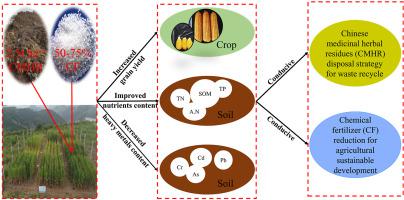Chemosphere ( IF 8.1 ) Pub Date : 2021-06-19 , DOI: 10.1016/j.chemosphere.2021.131262 Jifu Ma 1 , Yiping Chen 2 , Kaibo Wang 3 , Yizong Huang 4 , Hongjie Wang 5

|
Excessive utilization of chemical fertilizers (CF) is not a sustainable agricultural development strategy due to adverse effects on soil health. In contrast, a combination of organic and mineral fertilizers has a positive effect on both soil health and productivity. Chinese medicinal herbal residues (CMHR) is the plant material wastes remaining after drug extraction but has not been extensively used as fertilizer. We evaluated application of CMHR to maize fields over 3 consecutive growing seasons in the presence and absence of standard CF to assess improvements in soil fertility, maize yields and sustainable development. CMHR fertilization increased soil organic matter and total N and K when mixed with chemical fertilizer at 50 and 75% the standard application rate. Soil organic matter increased by 27.0–51.4% and available –N, -P and -K levels and grain yields as well as N and P use efficiency in the presence of CMHR mixes were similar to levels obtained with chemical fertilizer only. These increases in production were due to increased leaf areas, photosynthetic rates, grain number and 1000-grain weights. The addition of CMHR to fields posed a slightly risk of toxic-metal pollution. Overall, we found that (1) CMHR can be used as an effective organic fertilizer and replace up to 50% of the amount of chemical fertilizer normally applied to fields without hampering maize grain yields and (2) CMHR application to agricultural fields is an effective recycling strategy and nutrient management practice to improve soil fertility under CF usage reduction.
中文翻译:

中草药残留再利用提高土壤肥力,保持化肥减产玉米产量
由于对土壤健康的不利影响,过度使用化肥 (CF) 不是可持续的农业发展战略。相比之下,有机肥和矿物肥的组合对土壤健康和生产力都有积极影响。中草药残留物(CMHR)是药物提取后剩余的植物材料废物,但尚未广泛用作肥料。我们评估了在存在和不存在标准 CF 的情况下连续 3 个生长季节将 CMHR 应用于玉米田,以评估土壤肥力、玉米产量和可持续发展的改善。当与化肥以标准施用量的 50% 和 75% 混合时,CMHR 施肥增加了土壤有机质和全氮和全钾。土壤有机质增加了 27.0-51.4%,有效-N,-P 和 -K 水平和谷物产量以及在 CMHR 混合物存在下的 N 和 P 使用效率与仅使用化肥获得的水平相似。这些产量的增加是由于叶面积、光合速率、谷粒数和千粒重的增加。向田地中添加 CMHR 会带来轻微的有毒金属污染风险。总体而言,我们发现 (1) CMHR 可作为一种有效的有机肥使用,最多可替代田间常用化肥的 50%,而不会影响玉米的产量;(2) CMHR 应用于农田是一种有效的有机肥。循环策略和养分管理实践,以在减少 CF 用量的情况下提高土壤肥力。











































 京公网安备 11010802027423号
京公网安备 11010802027423号